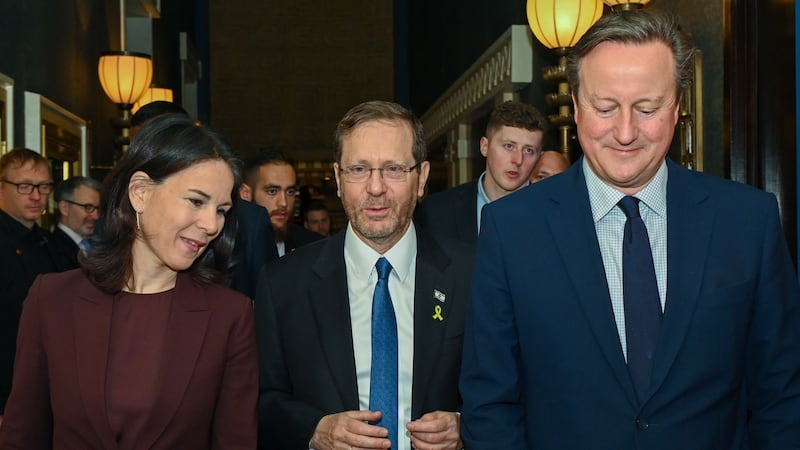Live updates: Follow the latest from Israel-Gaza
British Foreign Secretary David Cameron arrived in Israel on Wednesday as regional tension threatens to spill over, with Iran warning of a “harsh response” to any Israeli attack on its territory.
Lord Cameron, visiting Israel alongside German Foreign Minister Annalena Baerbock, is expected to address the humanitarian crisis in Gaza, which has been overshadowed by growing concerns of an all-out war, as Israel threatens to retaliate against Iran's drone and missile attack at the weekend.
“It's clear the Israelis are making a decision to act,” Lord Cameron told reporters in Jerusalem.
“We hope they do so in a way that does as little to escalate this as possible.”
Britain wanted to see co-ordinated sanctions against Iran, he said, hours after Washington confirmed it would impose new sanctions against Tehran in the coming days.
Israeli President Isaac Herzog said he held talks with Lord Cameron and Ms Baerbock on Wednesday, and called on the world to act “decisively and defiantly” against Iran.
Tehran “is seeking to undermine the stability of the whole region”, Mr Herzog's office said.
Iran launched a barrage of more than 300 missiles and drones overnight on Saturday, in its first direct attack on Israel. Tehran said this was in response to the killing of Islamic Revolutionary Guard Corps commanders in an Israeli air strike on its Damascus embassy compound on April 1.
Israel said 99 per cent of the projectiles were intercepted, but Iran has said that any future attack would be stronger and much harder to repel.
Iranian leaders ramped up their warnings against Israeli retaliation in speeches on Wednesday to mark Army Day, saying Israel would face a “terrible confrontation” in the event of an attack on Iran.
“If the smallest aggression is made by the Zionist regime on our land, they will be dealt with fiercely and severely,” state outlet IRNA quoted President Ebrahim Raisi as saying.
The weekend attack was deliberately small, Mr Raisi added, claiming that “nothing would be left” of Israel if Iran decided to launch a full-scale attack.
Iranian air force chief Brig Gen Hamid Vahedi said Israel would face an “irreparable response” if it made the “mistake” of striking back.
“The IRGC's action against Israel was a punitive action, and if this regime wants to make mischief, then it will face a harsh response and a major attack,” the semi-official Tasnim news agency quoted him as saying.
Naval Commander Shahram Irani said Iran’s navy is escorting Iranian commercial ships to the Red Sea.
“The navy is carrying out a mission to escort Iranian commercial ships to the Red Sea and our Jamaran frigate is present in the Gulf of Aden in this view,” Mr Irani was quoted as saying by Tasnim.
Israel's war cabinet is set to meet again on Wednesday to discuss its response to the Iranian attack.
Iran is bracing for a variety of scenarios. The leadership expects possible Israeli strikes on military sites linked to the weekend attack, sources told The National on Tuesday. Iran's proxy groups may also attack Israel if the strikes are “more aggressive than expected”, they said.
The Wall Street Journal reported on Wednesday that IRGC bases in Syria – a frequent target of Israeli attacks – have been evacuated in anticipation of assaults.
Sources in Damascus sources told the outlet that “emergency measures” have been put in place at Iranian military installations in Syria, although some IRGC members remain behind to guard weapons stores.






